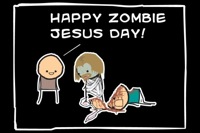 I'd never single out some random person and mock them for their private beliefs. It would be cruel to do so, and would likely accomplish nothing. Besides, I'd have no way of knowing what their private beliefs were in the first place. However, public beliefs are a somewhat different matter. Someone who introduces his or her beliefs into the public arena is asking for attention. In these cases, a response may be appropriate.
I'd never single out some random person and mock them for their private beliefs. It would be cruel to do so, and would likely accomplish nothing. Besides, I'd have no way of knowing what their private beliefs were in the first place. However, public beliefs are a somewhat different matter. Someone who introduces his or her beliefs into the public arena is asking for attention. In these cases, a response may be appropriate. Suppose a stranger approaches me in the parking lot of a local store and loudly informs me that he believes the Loch Ness monster is real and that scientists are concealing evidence. Whatever reluctance I might feel to mock private beliefs is not relevant here. I might opt not to mock this man at all. I might agree with him, suggest that he seek mental health treatment, attempt to steer clear of him out of fear, or any number of other responses that would not include mockery. But I may also laugh in his face, let him know that I disagree with him, or engage him in discussion with the goal of showing him the error of what he believes.
When someone introduces a belief into the public arena, dialogue about the belief is appropriate. My friend, who is in the process of shopping for a new car, approaches me and asks what I think about the model of Ford she's interested in. During the conversation, she tells me that she would never buy a foreign car because cars made in America are far more reliable than imports. She's serious. I'm probably going to suggest that she's wrong.
Religious beliefs are not any different. They are not entitled to special treatment simply because they are religious. When they are expressed in public, they are open to discussion, disagreement, and yes, even mockery and ridicule.
In the small Mississippi town where I live, there is an annual Easter tradition where a Baptist pastor and his associates carry a large wooden cross roughly 7 miles down one of the busiest sections of road in the town. This has gone on for 34 years now, and the intent, according to my local newspaper, involves "paying homage to the Biblical text that tells of the suffering and crucifixion of Jesus Christ."
Does this constitute a public expression of belief? Absolutely. Not only is this cross carried down one of the busiest sections of road around, the local police and sheriff's department provide escorts. So it is not only public in the sense of being put out there for all to see, but it is public in the sense that our local law enforcement agencies assist with it.
My argument is simple: by virtue of acts like this being public, they are fair game for discussion, disagreement, and even mockery. I would never dream of knocking on the door of this pastor's home or church and mocking him, but when he makes a public spectacle out of what he believes, other options become available (e.g., pointing and laughing, joining in dressed as Zombie Jesus, organizing an event at the same time to do something constructive).
Acts like this deserve no additional respect simply because they are motivated by religious belief. And the beliefs which motivate them deserve no additional respect simply because they are religious. Religious belief is not respectable, and it should not be treated as such, especially when it intrudes into the public arena.